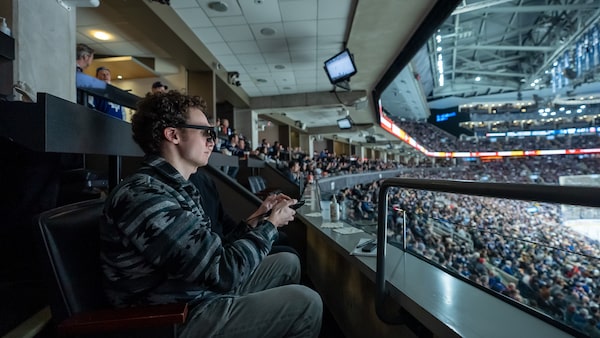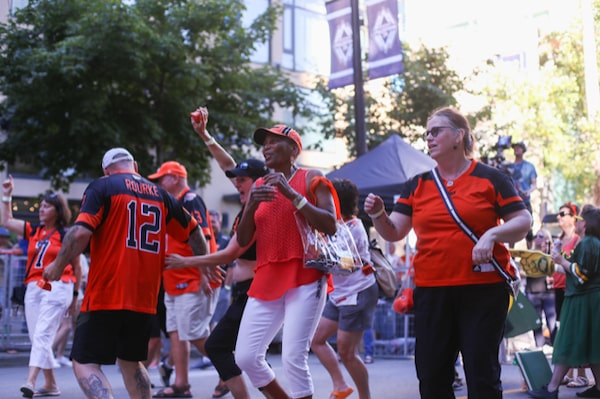
MLSE and Amazon Web Services have teamed up to create augmented and virtual reality fan experiences.Handout
Many would argue there’s nothing quite like the energy and excitement of being in a throng of fans in an arena cheering on a winning team. But in reality, almost half (46 per cent) of Canadians say watching a game at home is a better experience, according to The Modern Sports Fan 2022 report from Mintel.
Scott Stewart, associate director of lifestyles & retail for Mintel Canada, says stoppages and capacity limits throughout the pandemic have altered the way we watch sporting events. “During that time, a lot of people invested in improving their home entertainment experience, whether they got a bigger TV, sound bar or nicer couch,” he says. Couple that with rapid inflation of late and he says it’s not surprising that people are questioning whether to spend a small fortune on tickets for a game they can watch more comfortably at home.
In addressing this emerging consumer mindset, professional sports organizations are recognizing an increasing need to keep the in-person experience as seamless and exciting as possible if they want to keep fans coming back – and technology can play a key part in that.
Five years ago, Maple Leaf Sports & Entertainment (MLSE) started a quest to leverage digital innovation across its teams and business operations to drive new, enhanced fan experiences and those efforts are coming into play now, says Humza Teherany, chief technology and digital officer at MLSE. “Tickets are now 100 per cent digitized and everything happens through our mobile apps,” he says, noting the Leafs and Raptors apps are among the top in the NHL and NBA in terms of fan downloads. “Using these tools, fans can pre-order and prepay so they’re spending less time in lines and more time watching the game.”
Given that most fans get to sporting events only occasionally and may be unfamiliar with Toronto venues, MLSE’s digital team has also focused on reducing friction points wherever feasible with the use of sensors, machine learning and video recognition. For example, the Raptors and Leafs mobile apps provide wait times around entry gates, concessions stands and washrooms so fans can pick the shortest lines. There’s also advice on transit routes and parking, along with other things to know about the venue before fans go there.
“It’s all in an effort to make sure the focus is on the fun experience you’re going to have and not the stress of travelling,” says MLSE’s Christian Magsisi, vice-president, venue and digital technology.
It has taken some education, but he says people now understand if they’re coming to one of the venues and have the app, it will be easier to manoeuvre the space and participate in contests they wouldn’t have access to otherwise. “If you don’t have it, you’re still going to have a good time, but [the app] acts as a bit of a controller for the arena,” says Magsisi.
Sports enthusiasts can expect a lot more digital innovation on the horizon too. MLSE Digital Labs recently partnered with Amazon Web Services to launch a technology incubator program called SportsX to build augmented and virtual reality fan experiences. Initiatives currently under way include the NHL Extended Reality Stats Overlay, which allows those watching the game in-person to access real-time player stats and get deeper into the play on the ice through AR glasses.
Another is The Immersive Basketball Experience, which makes use of optical tracking data from the NBA and other partners to put fans “in the game” to relive some of their favourite game moments from the perspective of a player, or as though they were sitting courtside. “We think these platforms will have applications for the rest of the sports world as well and it’s all centred around fan experience,” said Magsisi.
There’s no question digital innovation creates new excitement around watching sports, but Mintel’s Stewart says organizations must find the delicate balance between using technology to enhance a fan experience and making it preferable to watch the action via screen alone. “If you push [the technology] too far … it becomes harder to differentiate from being at home and you might as well stay on your couch,” he says. “You still want the live sport to be the clear draw.”
For the BC Lions, enticing fans to attend in-person has involved creating entire game-day experiences. “Our motto is that the consumer’s game-day experience starts right when they leave their home,” said Matt Baker, manager of communications and content for the Vancouver-based football team. To that end, the club has hosted several pre-game tailgate parties, complete with live musical acts, happy hour drinks, and games for the kids. In March, the organization launched ticket packages that include round-trip bus transportation for B.C.’s interior and island fans.

To keep fans engaged, BC Lions hosts pre-game tailgate parties with live music, drinks and games.Handout
The locally owned organization is focused on developing future fans by connecting with minor football teams in the province and doing regular school visits where Lions players raise awareness around issues such as racism and environmental responsibility. With an expanded family seating zone for the 2023 season, there are discounted season tickets for fans 17 and under – and for the parents who accompany them. Six of the team’s 10 home games also start at 4 p.m. to encourage the younger set to take in a game before they head out for the evening.
“I’ve heard lots of feedback about how our crowds have gotten younger and more engaged, so I think it’s safe to say that these programs have been successful,” says Baker.